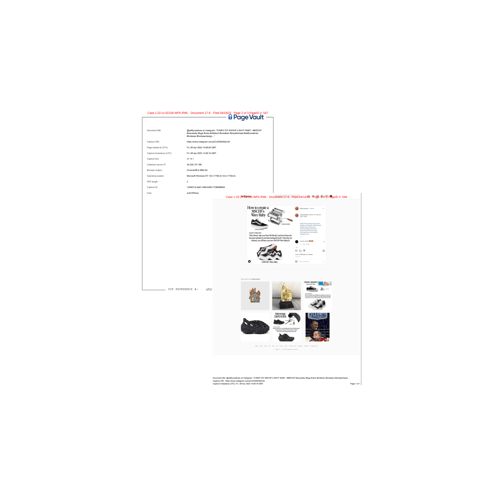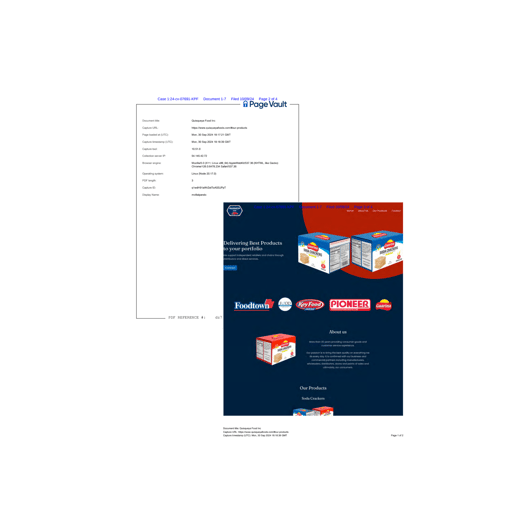From sneakers and coffee pods to mobile apps and even fake magazine covers, intellectual property (IP) disputes increasingly turn on what happens online. Product listings, social media promotions, and digital ads often become central to claims of trademark infringement, false advertising, or unfair competition.
But here’s the challenge: courts don’t accept screenshots at face value. If online evidence isn’t properly authenticated, it risks being excluded. Authentication shows the court that the content is genuine, captured at a specific time, and has not been altered—requirements judges consistently enforce under the Federal Rules of Evidence.
That’s why litigators in IP matters have turned to Page Vault. Our technology has been successfully used in federal courts across the country to capture websites, social media, in a way that meets evidentiary standards. Here are examples of IP cases where Page Vault evidence made the difference.
What the Rules Require: FRE 901 and 902(13)/(14)
Courts look to the Federal Rules of Evidence when deciding whether to admit digital evidence. Rule 901 requires that evidence be authenticated—essentially, proving it is what the proponent claims it is. For online material, that usually means showing who captured it, when it was captured, and how it was preserved.
Rules 902(13) and 902(14) go further, allowing certain electronic records to be self-authenticating if they include reliable metadata or certification from a qualified process. In practice, this means properly collected web captures—complete with timestamps, digital hashes, and affidavits—can come into court without the extra step of live testimony to prove authenticity.
👉 For more detail, see Page Vault’s post on presenting websites as digital evidence in court.
Pitfalls of DIY Screenshots
At first glance, it’s tempting to rely on simple screenshots or recordings from a phone or laptop. But courts have shown again and again that these methods fall short. DIY captures often:
- Create chain of custody gaps – no clear record of who took the capture or when.
- Lose metadata – screenshots strip away timestamps, URLs, and technical detail.
- Raise tampering concerns – with no embedded verification, they’re easy to challenge as altered or incomplete.
- Consume valuable time – manual scrolling, clicking, and capturing is inefficient, especially when dealing with large volumes of online content.
The result? Judges exclude them, leaving attorneys without the digital evidence their claims may depend on. By contrast, authenticated captures taken with the right tools preserve both the content and the technical proof needed to show it’s accurate and trustworthy.
👉 For a deeper breakdown, see Page Vault’s guide to screenshot tools for legal evidence and its article on preserving the chain of custody for digital evidence.
Recent IP Disputes Supported by Page Vault Captures
Trademark and Advertising Disputes
- Nespresso USA, Inc. v. Peet’s Coffee, Inc. (S.D.N.Y. 2022):
This case involved comparative advertising between two competitors in the single-serve coffee pod market. Nespresso alleged that Peet’s marketing and packaging misled consumers into thinking Peet’s capsules were affiliated with or endorsed by Nespresso.
Key to the case were Page Vault captures of Peet’s product pages and customer reviews, which documented the exact context in which consumers expressed confusion.
“Plaintiff included screenshots of consumer reviews on Defendant’s website, which Plaintiff alleges demonstrate that consumers have mistakenly believed that Defendant’s Capsule has an affiliation… with Nespresso.”
The court dismissed some claims but allowed others to proceed, underscoring how authenticated online evidence can make allegations of confusion concrete.
- Electronic Controls Company v. Emergency Technology, Inc. (D. Idaho 2023):
This dispute centered on two companies competing in the emergency lighting and siren market. Plaintiffs alleged that Emergency Technology’s online product marketing and advertising created trademark and unfair competition issues.
Page Vault captures of comparative product webpages and social posts ensured the court could consider the claims under FRE 901/902(13). The ruling reinforced that authentication requirements apply equally to digital evidence as to physical records, and that authenticated web captures provide the reliability courts demand.
Injunctions Backed by Online Proof
- Vans, Inc. v. MSCHF Product Studio, Inc. (E.D.N.Y. 2022):
Vans brought a trademark infringement claim against MSCHF over its “Wavy Baby” sneakers,
which distorted Vans’ iconic Old Skool shoe design. MSCHF argued artistic expression under the Rogers test, but the court sided with Vans and granted a preliminary injunction. 
Authenticated Page Vault captures of MSCHF’s online promotions and product listings were part of the evidentiary record. As the Second Circuit panel explained in its opinion:
“MSCHF’s Wavy Baby sneakers are likely to cause consumer confusion as to the source or sponsorship of the shoes.”

- Advance Magazine Publishers Inc. (Vogue) v. Graham (S.D.N.Y. 2022):
As part of an album rollout, Drake and 21 Savage distributed promotional materials styled as Vogue magazine covers and flooded social media with the imagery. Vogue’s publisher sued for false designation of origin and trademark infringement.
Page Vault captures of Instagram posts, YouTube videos, and promotional websites documented the campaign in its original form. That evidence allowed the court to quickly conclude that the defendants’ conduct was unauthorized and misleading, supporting a preliminary injunction.
- WEX Inc. v. HP Inc. (D. Me. 2024):
This dispute involved the use of WEX’s “EFS” mark in digital branding and online product naming by HP. WEX sought a preliminary injunction under the Lanham Act.
Page Vault captures of HP’s online marketing provided authenticated evidence of the contested branding. The court granted a limited preliminary injunction, finding likely confusion, and the parties subsequently reached a settlement.
Consent Judgments and Resolutions

- CMI IP Holding v. Quisqueya Foods Inc. (S.D.N.Y. 2024):
This matter involved allegations of trademark infringement and packaging misrepresentation. Online product listings and brand site references showed the alleged misuse of CMI’s marks.
Page Vault captures gave the plaintiffs the authenticated documentation needed to press their case, which ended in an agreed consent judgment. The opinion noted procedural clarity:
“Pursuant to Fed. R. Civ. P. 15(a)(1)… a party may amend its pleading once as a matter of course… Accordingly, Respondent’s motion to dismiss is moot and will be given no consideration.”
- Yondr Inc. v. Nexverum Inc. (W.D. Wash. 2023):
This case revolved around ownership and trade-dress claims in the marketing of consumer goods. Page Vault captures of product pages and promotional social media posts were used during district court proceedings and later cited on appeal.
The appellate court ultimately dismissed for lack of jurisdiction, but the record demonstrated the value of authenticated online evidence at both trial and appellate levels.
Early Filings Strengthened by Digital Captures
- ROADGET Business PTE. LTD. v. PDD Holdings Inc. (D.D.C. 2024):
SHEIN filed suit against Temu alleging false advertising and misuse of SHEIN’s intellectual property. At this very early stage, Page Vault captures of app-store descriptions, in-app ads, and social media marketing created a reliable evidentiary record before any merits ruling had occurred.
- Henkel Corporation v. BeautyandWoman, LLC (D. Mass. 2024):
Henkel alleged trademark infringement based on BeautyandWoman’s online sales and promotional use of its marks. Page Vault captured the contested product listings and online storefronts.
The record reflects how courts treat authenticated online evidence:
“Generally, the Federal Rules of Evidence apply to Board trials. Trial testimony is taken and introduced out of the presence of the Board during the assigned testimony periods.”
- Big Heart Pet, Inc. v. NZ Natural Pet Food Ltd. (N.D. Cal. 2024):
This case involves Lanham Act false advertising and trademark claims related to branding and product claims on e-commerce platforms. Page Vault authenticated captures of websites and social promotions gave the pleadings a solid foundation and allowed the claims to withstand early motion practice.
The Pattern Is Clear.
Across industries and jurisdictions, courts are willing to rely on online evidence—if it’s authenticated. Page Vault has been successfully used in federal courts to preserve websites, ads, and social media in a way that meets evidentiary standards and withstands challenges.
Whether used to support injunctions, frame pleadings, or secure settlements, Page Vault helps ensure digital evidence is admissible and persuasive.
👉 For more, see Page Vault’s FAQ on establishing authenticity of online evidence.
Practical Tips for Collecting Online Content
When collecting online evidence for IP disputes, a few best practices go a long way:
- Capture early and often. Websites, ads, and social posts can change or disappear overnight. Lock them down as soon as they become relevant.
- Preserve context. Don’t just capture the text or image—include surrounding elements like URLs, timestamps, and page layout to show how consumers would have experienced the content.
- Think authentication from the start. Use tools that embed metadata, create digital hashes, and provide affidavits so you don’t have to scramble later to prove reliability.
- Avoid shortcuts. Screenshots and videos may seem quick, but they rarely satisfy FRE 901/902 standards and can sink key evidence.
Taking these steps up front ensures your online exhibits aren’t just compelling—they’re admissible.
Want to learn how Page Vault can support your next matter? Contact us today to schedule a demo.

